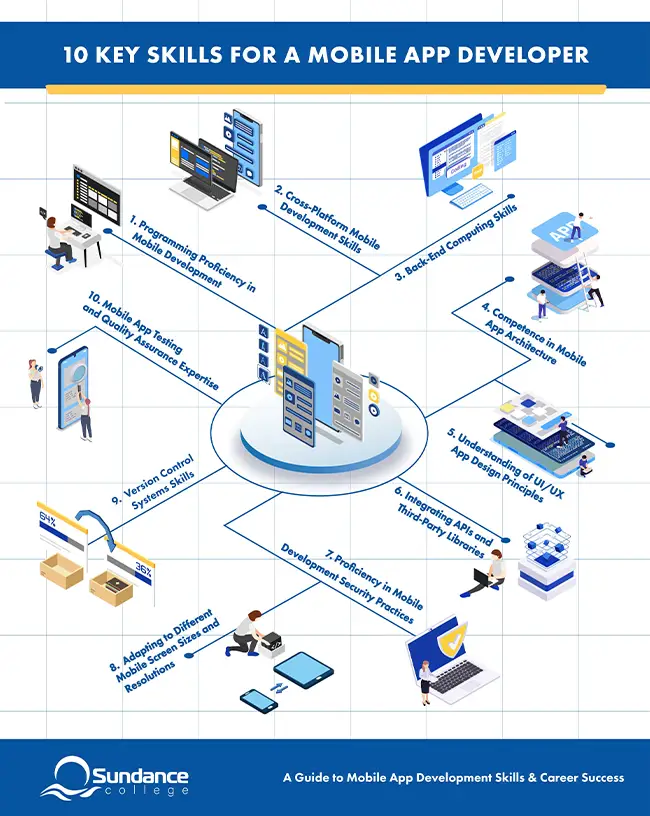Blog / Key Skills for Network Managers and How You Can Gain Them
Key Skills for Network Managers and How You Can Gain Them

Network Systems Manager Diploma
- Network Administrator
- Network Systems Administrator
- IT Support Technician
- Network Support Technician
Table of Contents
Could you imagine being at work when the entire computer network goes down and there’s nobody around to fix it? Probably not!
Businesses need skilled network systems managers to design, implement, and maintain these networks. These IT professionals ensure that data remains secure, communication flows smoothly, and technology infrastructure meets the demands of the business operations.
Whether you aspire to become a network systems manager or aim to enhance your current role, you will want to acquire and master key skills to excel in this field. Let’s explore the required network management skills and discover which specific courses from Sundance College’s Network Systems Manager Diploma program can help you master each skill.
Listen to “Key Skills for Network Managers and How You Can Gain Them”
Network Hardware Skills
As a network systems manager, your job is to maintain the hardware in your organization’s computer networks. This includes components like computers, printers, VoIP phones, routers, switches, servers, and cables. You need to make sure these tools work smoothly to support the company’s communication, operation, and data transfer needs.
For example, when it’s time for a meeting, you’ll need to set up video conferencing equipment and make sure everyone can see and hear each other. If the meeting is online, you’ll need to configure Wi-Fi routers and make sure the internet connection is strong enough for everyone to join without any problems. If there are any issues, you’ll need to fix them quickly so the meeting can go smoothly.
To boost your hardware configuration knowledge, Sundance College’s Network Systems Manager (NSM) program includes IT Fundamentals and Network+ courses. Through them, you’ll learn hardware specifications, how to configure networking devices (e.g. motherboards, processors, memory, hard drives), manage, and maintain computer hardware.
Proficiency in Software Systems
Software systems proficiency enables network managers to configure and manage network operating systems and software-defined networking solutions.
This skill involves tasks like setting up work equipment for new employees, creating work accounts, explaining login procedures, and enforcing security policies. Additionally, network managers ensure regular software updates and upgrades to enhance overall productivity and efficiency of all team members within the organization.
Sundance College offers courses like Microsoft Azure Administrator, IT Fundamentals II, and Security+ as part of our NSM Diploma program to develop these skills. Through hands-on experience, our students learn how to configure network operating systems such as Microsoft Windows 10 and macOS, implement security measures, and stay updated with software advancements.
Network Infrastructure Management Competence

A strong understanding of network infrastructure is essential for designing, implementing, and optimizing network environments. This skill involves understanding networking principles, protocols, and technologies to ensure efficient data transmission and communication within an organization.
For instance, if your company moves to a larger office, as a network systems manager, you could be tasked with designing scalable network architectures, selecting proper hardware, and establishing reliable connectivity, including Local Area Networks (LANs) and Wide Area Networks (WANs). Your proficiency in networking protocols like Spanning Tree Protocol (STP) and troubleshooting LAN switching, as well as Internet Protocol version 4 (IPv4) and IPv6 routing issues are essential to maintain network stability and performance.
Sundance College offers courses such as CCNA Routing and Switching and Network+ in its Network Systems training diploma program to help students develop all the above-described network architecture skills.
Network Security Expertise
With cybersecurity threats on the rise, network systems managers must possess robust cybersecurity skills to safeguard organizational data and infrastructure from malware, hacker attacks, leak of sensitive information, and more.
As a network systems manager, you will be responsible for deploying firewalls, intrusion detection systems, and encryption protocols to protect against unauthorized access and data breaches.
Additionally, you will conduct regular security audits and penetration testing to assess the network’s resilience against potential cyber-attacks. You will also take part in educating employees about cybersecurity best practices and enforcing security policies to mitigate risks associated with human error.
Information security training is part of the Sundance’s Network Systems Manager Diploma program. It consists of the “Microsoft Azure Security Technologies” and “Security+” courses that equip students with skills to meet network security requirements. Our students learn about various security measures, including information security, malware and social engineering attacks, cryptography and public key infrastructure (PKI), networking and server attacks, mobile and embedded device security, and more.
Cloud Computing Proficiency
Proficiency in cloud computing platforms like Microsoft Azure is crucial for network systems managers responsible for securely storing vast amounts of business data. Their primary role involves effectively managing and maintaining data on such platforms.
In settings like healthcare organizations, where the management and security of patients’ data are paramount, entire departments of IT support technicians and network managers work diligently to protect, store, maintain, and organize patients’ data on cloud servers.
To equip you with advanced cloud computing skills, Sundance College has the “Microsoft Azure Architect” course as part of our NSM diploma program. This course expands on topics such as configuring and managing high availability, file and storage solutions, and Active Directory infrastructure (Microsoft’s proprietary directory service, operating on Windows Server), to name a few.
Server Administration Abilities

Managing server infrastructure is another core responsibility of network systems managers. You will design, implement, configure, and manage server networks to support business operations.
In the course “Managing Modern Desktops” offered as part of Sundance’s Network Systems Manager Diploma program, you will take fundamental Microsoft Server administration training, particularly – how to design, implement, configure, and manage a Windows network integrated with Windows 10 Server, ensuring optimal performance, security, and reliability.
Mastery of Customer Service
As a network systems manager, you may often serve as a primary point of contact for resolving technical issues and ensuring user satisfaction. Your customer service skills should involve providing support with installation, configuration, troubleshooting, optimization, and maintenance of computer operating systems.
In the IT Fundamentals II course offered as part of Sundance’s NSM diploma program, you will explore Microsoft Windows 10 and macOS, focusing on exceptional customer service training. Through hands-on projects, you’ll be able to gain practical experience in addressing user needs and resolving technical issues.
Problem-Solving and Troubleshooting Skills
Technical troubleshooting skills are essential for network systems managers to identify and resolve technical issues efficiently, minimizing downtime and ensuring the smooth operation of network systems.
Sundance College’s curriculum emphasizes hands-on problem-solving techniques and troubleshooting scenarios in courses like IT Fundamentals and CCNA Routing and Switching II. Students develop analytical thinking skills and learn systematic approaches to effectively diagnose and resolve network issues.
Communication and Collaboration Skills
Communication and collaboration skills are vital for network systems managers to effectively interact with team members, clients, and other stakeholders. Clear communication and collaboration in network teams promote efficient project execution and successful network implementations.
Throughout the 48-week NSM program at Sundance College, students receive vast communication skills training. During hands-on projects, working in teams, you can learn to clearly convey technical concepts, actively listen, and effectively collaborate with your instructors and classmates to achieve common goals.
Using these communication skills, you will be able to build a network of peers and instructors. Strong relationships can be key to career success and advancement.
For our students’ success, we’ve handpicked industry-experienced instructors who consistently receive rave testimonials. Take it from Adela G., one of our Network Systems Manager Diploma program graduates:
“I did the Network Systems Manager Diploma with Samir and Prakash, who were excellent instructors to have, I really lucked out with them! I don’t believe that I would’ve been able to complete post-secondary education without their help, they were extremely accommodating and ready to help. You’ll have every resource available to help you understand the materials, and the instructors are there to help you out!”
Cultivating rapport with your instructors ensures your efficient learning of the network systems management program, timely and quality mentorship, and valuable references for your seamless employment in IT.
Project Management Abilities
Fundamental IT project management skills are essential for network systems managers to successfully plan, execute, and deliver network implementations on time and within budget.
Sundance College integrates project management principles into its curriculum of the NSM Diploma program. As our student, you will gain experience in defining project scopes, allocating resources, and managing timelines through hands-on projects – everything you need to excel in your network systems manager role.
Adaptability and Continuous Learning Culture
Adaptability and continuous learning are critical for network systems managers to stay abreast of technological advancements and industry best practices.
Taking the NSM Diploma program at Sundance College means you become fully prepared to obtain necessary IT industry certifications such as CompTIA A+, 200-301 CCNA, and Microsoft Certified: Azure Security Engineer Associate. By continuously updating your network systems management skills and knowledge, you will improve your adaptability in IT and remain equipped to meet the demands of this ever-evolving tech field.

How You Can Learn and Practice Network Management Skills
You’ve got it: To prepare for a job as a network systems manager, you can enroll in our Network Systems Manager Diploma program. With a curriculum designed to boost your IT skills development and get you hired in less than a year, it’s the perfect stepping stone for your career in network management.
With our comprehensive curriculum and dedicated instructors, you’ll be well-prepared to start your rewarding career as a network systems manager. Fill in our contact form to learn more about the enrollment and learning processes at Sundance.
Related Blogs
Subscribe for more career advice
Blog Categories
Share on:
